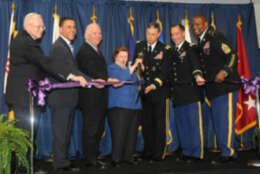Cyber Command
-
The director of intelligence at U.S. Cyber Command said the command has the capacity to significantly damage a country's infrastructure if necessary. Rear Adm. Samuel Cox said such an attack would only come after officials at the highest levels of government approved the operation because there would be a risk of collateral damage.
May 11, 2012 -
Gen. Keith Alexander said a recent cyber exercise is the first time the military showed it can do offensive and defensive capabilities at the same time, by the same team. This was part of Alexander's answers to questions from Sen. John McCain.
May 04, 2012 -
The government is working with a cobbled-together set of authorities and responsibilities when it comes to protecting networks from cyber threats, a top Homeland Security Department cyber official said Wednesday. Congress needs to act soon to update the nation's cybersecurity posture, he said.
May 03, 2012 -
A pilot program DoD established to share cyber threat information between the NSA and Defense companies will be made permanent and expanded to include approximately 200 companies in the coming months.
April 25, 2012 -
For a progress report on how the military is combating the cyber threat and a look at the near term future, officials from the Army, Navy and Air Force cyber commands joined the Federal Drive with Tom Temin and Amy Morris for a special Federal News Radio panel discussion.
October 26, 2011 -
The Joint Staff is reviewing the doctrine, which should define when the military can go on the cyber offensive. Once it is approved, Cyber Command will put out guidance and tailor its training accordingly.
October 21, 2011 -
The outgoing chief of staff for U.S. Cyber Command said recently the military\'s professional cyber corps has strong, diverse capabilities.
September 28, 2011 -
Rear Adm. Sean Filipowski will take over from Rear Adm. Jan Tighe as the deputy director of operations at Cyber Command.
July 05, 2011 -
The Government Accountability Office says the Defense Department needs to step up its cybersecurity training.
June 21, 2011 -
In a column for Federal News Radio, Ft. Meade Commander Col. Dan Thomas says, \"By this fall, the official worker population of Fort Meade will have grown to more than 48,000. This is 13,000 more personnel than we had three years ago - you do the math: if BRAC growth is 5,400, who are all these other people?\"
May 10, 2011 -
The Deputy commander of Navy Fleet cyber command Rear Admiral Bill Leigher explains the significance of this realignment.
May 02, 2011 -
The Defense Information Systems Agency celebrated the ceremonial opening of its new 95-acre headquarters campus on Friday. Less than half of the 4,600 employees already work at its new headquarters at Fort Meade, Md. The agency expects the rest of its staff to move there from several northern Virginia locations by late August.
April 18, 2011 -
Sen. Sheldon Whitehouse (D-R.I.), who led a Senate Intelligence Committee review of cybersecurity policy last year, said he is hopeful that Congress will be able to pass an overhaul of cyber laws this year. Whitehouse has been critical of the pace at which the Obama Administration has moved to propose such changes to lawmakers.
April 11, 2011 -
The head of U.S. Cyber Command says cloud computing is part of his plan for staying ahead of the cyber threats that face the Defense Department. “A year from now we should be well on our way to having a hardened architecture proven and in place, which provides a new level of cybersecurity,” said General [...]
March 29, 2011 -
Gen. Keith Alexander has outlined a series of next steps to be pursued by the six-month-old U.S. Cyber Command.
March 23, 2011


